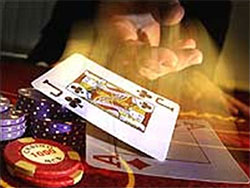Pathological Gambling Definition
Pathological gambling: A review of the neurobiological evidence relevant for its classification as an addictive disorder. Pathological gamblers are unable to cut back on their gambling, despite the fact that it may lead them to lie, steal, or lose a significant relationship, job, or educational opportunity. Many people enjoy gambling, whether it's betting on a horse or playing poker on the internet. Pathological gambling is an uncontrollable compulsive urge to continue gambling despite the financial and social toll it may take on the person's life. The individual may increase his/her gambling habits to the point of financial distress, often sacrificing commitments and responsibilities to get more money and gamble it. Gambling addiction, also referred to as problem gambling or pathological gambling, is marked by intense urges to engage in gambling that is deleterious to the addict’s financial and social well-being. Gambling typically takes place in the context of casino gambling or casino-like online gambling games. Pathological gambling Tabular List of Diseases and Injuries The Tabular List of Diseases and Injuries is a list of ICD-10 codes, organized 'head to toe' into chapters and sections with guidance for inclusions, exclusions, descriptions and more.
Pathological gambling
- 201620172018201920202021Billable/Specific Code
- F63.0 is a billable/specific ICD-10-CM code that can be used to indicate a diagnosis for reimbursement purposes.
- The 2021 edition of ICD-10-CM F63.0 became effective on October 1, 2020.
- This is the American ICD-10-CM version of F63.0 - other international versions of ICD-10 F63.0 may differ.
- Compulsive gambling
- Gambling disorder
- gambling and betting NOS (Z72.6)
Gambling and betting
- 201620172018201920202021Billable/Specific CodePOA Exempt
Type 1 Excludes- compulsive or pathological gambling (F63.0)
Pathological Gambling Definition Medical
- excessive gambling by manic patients (F30,
Manic episode
- 201620172018201920202021Non-Billable/Non-Specific Code
Includes- bipolar disorder, single manic episode
- mixed affective episode
Type 1 Excludes- bipolar disorder (F31.-)
- major depressive disorder, single episode (F32.-)
- major depressive disorder, recurrent (F33.-)
ICD-10-CM Diagnosis Code F31F31)Bipolar disorder
- 201620172018201920202021Non-Billable/Non-Specific Code
Includes- bipolar I disorder
- bipolar type I disorder
- manic-depressive illness
- manic-depressive psychosis
- manic-depressive reaction
Type 1 Excludes- bipolar disorder, single manic episode (F30.-)
- major depressive disorder, single episode (F32.-)
- major depressive disorder, recurrent (F33.-)
- gambling in antisocial personality disorder (F60.2)
Antisocial personality disorder
- 201620172018201920202021Billable/Specific Code
Applicable To- Amoral personality (disorder)
- Asocial personality (disorder)
- Dissocial personality disorder
- Psychopathic personality (disorder)
- Sociopathic personality (disorder)
Type 2 Excludes- borderline personality disorder (F60.3)
- Applicable To annotations, or
- Code Also annotations, or
- Code First annotations, or
- Excludes1 annotations, or
- Excludes2 annotations, or
- Includes annotations, or
- Note annotations, or
- Use Additional annotations
 that may be applicable to F63.0:
that may be applicable to F63.0: - F01-F992021 ICD-10-CM Range F01-F99Mental, Behavioral and Neurodevelopmental disorders
Mental, Behavioral and Neurodevelopmental disorders
Type 2 Excludes- symptoms, signs and abnormal clinical laboratory findings, not elsewhere classified (R00-R99)
- F63ICD-10-CM Diagnosis Code F63Impulse disorders
Impulse disorders
- 201620172018201920202021Non-Billable/Non-Specific Code
Type 2 Excludes- habitual excessive use of alcohol or psychoactive substances (F10-F19)
- impulse disorders involving sexual behavior (F65.-)
Pathological Gambler Define
Approximate Synonyms- Compulsive gambling
- Gambling disorder
- Gambling disorder, in early remission
- Gambling disorder, in sustained remission
- Gambling disorder, mild
- Gambling disorder, moderate
- Gambling disorder, severe
- A disorder characterized by a preoccupation with gambling and the excitement that gambling with increasing risk provides. Pathological gamblers are unable to cut back on their gambling, despite the fact that it may lead them to lie, steal, or lose a significant relationship, job, or educational opportunity.
- Many people enjoy gambling, whether it's betting on a horse or playing poker on the internet. Most people who gamble don't have a problem, but some lose control of their gambling. Signs of problem gambling include
- always thinking about gambling
- lying about gambling
- spending work or family time gambling
- feeling bad after you gamble, but not quitting
- gambling with money you need for other things
- 883 Disorders of personality and impulse control
Convert F63.0 to ICD-9-CM
Code History- 2016 (effective 10/1/2015): New code (first year of non-draft ICD-10-CM)
- 2017 (effective 10/1/2016): No change
- 2018 (effective 10/1/2017): No change
- 2019 (effective 10/1/2018): No change
- 2020 (effective 10/1/2019): No change
- 2021 (effective 10/1/2020): No change
- Type 1 Excludes: Z72.6ICD-10-CM Diagnosis Code Z72.6
Gambling and betting
- 201620172018201920202021Billable/Specific CodePOA Exempt
Type 1 Excludes- compulsive or pathological gambling (F63.0)

- Betting and gamblingZ72.6ICD-10-CM Diagnosis Code Z72.6
Gambling and betting
- 201620172018201920202021Billable/Specific CodePOA Exempt
Type 1 Excludes- compulsive or pathological gambling (F63.0)
- pathological F63.0 (compulsive)
- gambling F63.0
- Disorder (of) - see also Disease
- gambling F63.0
- GamblingZ72.6ICD-10-CM Diagnosis Code Z72.6
Gambling and betting
- 201620172018201920202021Billable/Specific CodePOA Exempt
Type 1 Excludes- compulsive or pathological gambling (F63.0)
- pathological F63.0 (compulsive)
- Pathologic, pathological - see also condition
- gambling F63.0


Pathological Gambling Definition
Pathological Gambling Definition Synonyms
Reimbursement claims with a date of service on or after October 1, 2015 require the use of ICD-10-CM codes.